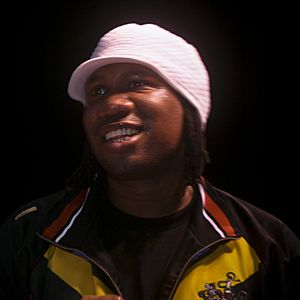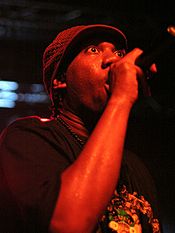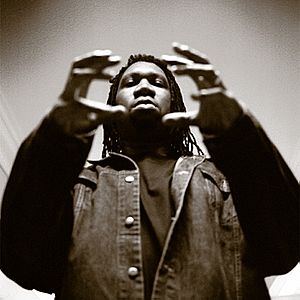KRS-One facts for kids
Quick facts for kids
KRS-One
|
|
|---|---|

KRS-One in 2008
|
|
| Background information | |
| Birth name | Lawrence Parker |
| Also known as |
|
| Born | August 20, 1965 Brooklyn, New York City, U.S. |
| Origin | The Bronx, New York City, U.S. |
| Genres |
|
| Occupation(s) |
|
| Years active | 1986–present |
| Labels |
|
Lawrence Parker (born August 20, 1965), better known as KRS-One, is an American rapper from the Bronx, New York. His name is an acronym for "Knowledge Reigns Supreme Over Nearly Everyone." He is also known by the nickname "Teacha" because his lyrics often educate listeners about social issues.
KRS-One first became famous with his hip-hop group, Boogie Down Productions. He started the group in the mid-1980s with DJ Scott La Rock. Some of his most famous songs are "Sound of da Police" and "My Philosophy."
After his friend and group member Scott La Rock tragically passed away, KRS-One started the "Stop the Violence Movement." He is also a vegan activist and talks about it in songs like "Beef." Many people see him as a major influence on hip-hop music.
Contents
Biography
Early Life
Lawrence Parker was born in Brooklyn, New York, in 1965. He had a difficult childhood and left home when he was 16. For a time, he lived in homeless shelters in New York City.
While living in a shelter in the South Bronx, he became interested in hip-hop culture. He practiced his skills as a rapper, also known as an MC, and did graffiti art. It was at the shelter that he met a youth counselor named Scott Sterling, who was also a DJ known as Scott La Rock.
Becoming a Hip-Hop Pioneer
KRS-One and Scott La Rock decided to form a group called Boogie Down Productions. They released their first album, Criminal Minded, in 1987. This album, along with Paid in Full by Eric B. & Rakim, helped change the sound of hip-hop.
Later albums by KRS-One, like By All Means Necessary (1988), and Public Enemy's It Takes a Nation of Millions to Hold Us Back (1988), brought more social and political messages to rap music. This style became known as "conscious rap."
Career with Boogie Down Productions
KRS-One started his music career with the group Boogie Down Productions, also known as BDP. The group also included DJ Scott La Rock and Derrick "D-Nice" Jones.
The Bridge Wars
One of BDP's first famous moments was a musical rivalry known as "The Bridge Wars." It started with a song by rapper MC Shan called "The Bridge." Some people, including KRS-One, thought the song claimed that the Queensbridge neighborhood was the birthplace of hip-hop.
KRS-One and BDP responded with a "diss track" called "South Bronx" to defend their home borough. This led to more songs back and forth, like BDP's famous track "The Bridge Is Over." Many fans believe KRS-One won the rap battle, which helped make him a star.
Continuing After Tragedy
In 1987, just after their first album came out, Scott La Rock was tragically killed while trying to stop a fight. KRS-One was determined to keep the group's name alive to honor his friend.
He continued Boogie Down Productions, and the group's music became more focused on social issues. He was joined by his brother Kenny Parker and other artists. BDP released several more albums, including Ghetto Music: The Blueprint of Hip Hop (1989) and Edutainment (1990).
Solo Music Career

After five albums with Boogie Down Productions, KRS-One started releasing music under his own name in 1993.
His first solo album was Return of the Boom Bap. It included the hit song "Sound of da Police". His next album, KRS-One (1995), featured guest appearances from other famous rappers like Busta Rhymes and Fat Joe.
In 1997, his album I Got Next became his best-selling solo record. It reached number 3 on the Billboard 200 music chart. The album's most popular single, "Step into a World (Rapture's Delight)," used a sample from the new wave band Blondie.
Over the years, KRS-One has released many albums. He has explored different themes, including spirituality in his 2002 album Spiritual Minded. In 2007, he worked with producer Marley Marl on the album Hip Hop Lives. This was seen as a response to the rapper Nas's album Hip Hop Is Dead.
He continues to make music and has released over 20 solo albums. His recent projects include Between da Protests (2020) and I M A M C R U 1 2 (2022).
Activism and Positive Movements
KRS-One has used his fame to promote positive change. He is known for his activism and for starting groups that promote peace and education.
Stop the Violence Movement
After the death of Scott La Rock and another violent incident at a concert, KRS-One started the Stop the Violence Movement in 1989.
He brought together many famous East Coast rappers to record a song called "Self Destruction." The song's message was about ending violence in their communities. All the money from the single was donated to the National Urban League to support urban communities.
Temple of Hip Hop
KRS-One also founded the Temple of Hip Hop. It is an organization dedicated to preserving hip-hop as a positive culture. The Temple of Hip Hop teaches that hip-hop is more than just music. It is a culture with its own history, values, and power to bring people together.
The organization supports "Hip Hop Appreciation Week" every May. It encourages artists to create socially conscious music and radio stations to play it.
Personal Life
Parker is a supporter of veganism, a lifestyle that avoids all animal products.
His stepson, Randy Parker, died in 2007. His son, Kris Parker, is a music producer and DJ.
Awards
- Bronx Walk of Fame (2001)
- VH1
- 2004, VH1 Hip Hop Honors
- BET Hip Hop Awards
- 2007, I Am Hip Hop
- 2007, Lifetime Achievement
- Urban Music Awards
- 2009, Living Legend Award
Discography
Studio albums
|
Boogie Down Productions albums
Collaboration albums
|
See also
 In Spanish: KRS-One para niños
In Spanish: KRS-One para niños
 | Roy Wilkins |
 | John Lewis |
 | Linda Carol Brown |


